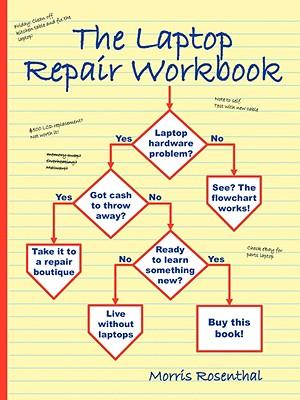This book will help you troubleshoot your laptop problem and take the most cost effective approach to repairing it, getting it repaired, or replacing it. But the troubleshooting process depends on your observations of the symptoms and your willingness to keep your mind open to solutions other than your first impression, or those suggested by friends who say they had "exactly the same problem." If the laptop is still usable but acts up, pay close attention to when and where it acts up, whether the problem always occurs after the laptop has been moved, or shut-down for the night, or running all day. Even the weather plays a part in troubleshooting some problems, so try to read through all of the general troubleshooting sections, just to get a feel for the things that go wrong with different components. If it doesn't make you into a laptop hypochondriac, it will make you a stronger diagnostician.
You may notice we don't talk about the razzle-dazzle technology of computer components in this book. The reason is simple. You can't upgrade or repair your laptop by using the latest technology available, nor can you save money by repairing it with older technology rescued from a random laptop at the recycling center. You have to use the exact parts your laptop was engineered to work with. Hard drives and memory are the only replaceable parts that are often compatible between models of a similar vintage. For some readers, the lack of an illustrated discussion on how hard drives store data bits will take some fun out of the book, but that knowledge can't help you when it comes to troubleshooting. There are plenty of books with beautiful color illustrations that try to explain basic computer technology, but they do so at the expense of helping you solve real laptop problems.
Two final notes about using this workbook. First, if your laptop is in warranty, it doesn't make any sense to take it apart in hopes of fixing something yourself. This book can still help you troubleshoot the problem to determine if it's a software setting or incorrect use, which may save you sending the laptop out for repair. Second, feel free to cut out the twelve flowcharts in the second half of the book and staple them together. This will save on page flipping as you read the expanded explanations of the decision symbols. It's a workbook, not English literature.
The Laptop Repair Workbook includes twelve full page troubleshooting flowcharts for laptop hardware troubleshooting and explanatory text for every decision point. The book begins with an introduction to basic laptop terminology, troubleshooting procedures, and cost decisions.
